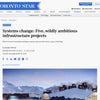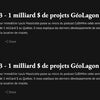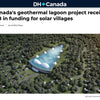Invest in a Airbnb chalet
with the designated builder
[EN] Geo force: Geothermal lagoon Canada
Read complete article on Attractions Management
One of the world’s largest man-made geothermal developments is set to make a splash in Québec in 2024, Spa Business dives in to discover the detailsPlans for a net-zero geothermal bathing lagoon and chalet village near Québec City, Canada are blazing a trail in sustainability.
GeoLagoon, a privately funded company, is on a mission to create a relaxing nature-centric eco-village which it claims will be powered entirely by natural resources in Charlevoix, a region north-west of the province’s capital.
The beating heart at the centre of the destination is a man-made 120,000sq ft lagoon which is one of the largest of its kind in the world (see p34).
Underneath the lagoon a vast patent-pending thermal reservoir will be heated to 70˚C by a combination of geothermal, solar and biomass energy.
This is designed to not only keep the lagoon at a toasty 38˚C throughout the year, but to also heat the accommodation.
It’s proposed that the site will feature 300 prefab chalets clad in solar and thermal panels, which will power the water heaters in the reservoir.
GeoLagoon is owned by Louis Massicotte. The Canadian entrepreneur is the former president of the leisure complex Village Vacances Valcartier and also has a background in technology and marketing. He created the concept having been impressed by Iceland’s iconic Blue Lagoon bathing destination.
He told Spa Business: “Our aspiration is to create an international benchmark for renewable energy models, the goal is to become carbon-positive and produce more energy than we consume.”
Funding the vision
Massicotte estimates that the GeoLagoon will cost a minimum of CAD$325m (US$244.8m, €235.4m, £207m) and potentially up to CAD$500m (US$376.5m, €362.3m, £318.6m) to realise.
To finance the construction, GeoLagoon is selling the chalets to investors who can then rent them out in the short-term to tourists or people who want to live in them. Prices for the chalets start at CAD$819,000 (US$615,400, €592,600, £519,400).
GeoLagoon won’t provide rental management services for the properties but it will designate a firm for home-owners to use. The lagoon itself will be owned and operated by a third-party corporation, which will also handle ticket sales for day visitors, creating another revenue stream.
Weaving in wellness
Massicotte says that up to 2,000 people will be able to enjoy the lagoon’s warm waters at any one time. “Guests will be able to bathe and enjoy epic mountain views during the day and soak by star and moonlight in the evenings,” he says.
The team is also looking to collaborate with a third party operator to open a world-class spa at the property. No spa consultant has been appointed yet as Massicotte feels this will be up to the operator.
He predicts the spa will cover around 500sq m and include 25 treatment rooms in addition to a floating massage service in the lagoon.
Location, location, location
Work hasn’t started on the Charlevoix site as a permit has yet to be granted. Massicotte is hopeful the company’s focus on nature will help sway the authorities. His aim is to begin construction in March 2023 and to complete the project by December 2024.
It’s highly ambitious. But then so is Massicotte. He already has sites mapped out for three more GeoLagoons – in Lanaudière, The Laurentians and The Eastern Townships. Each on the same size and scale as the one in Charlevoix.
All locations have been selected thanks to their proximity to Québec City or Montréal meaning they’re easily accessible to urban dwellers – each is around an hour’s drive from one of the cities.
Massicotte’s aspirations don’t just stop there, however. “The business plan and the technology were created to be duplicated anywhere,” he reveals, “we have 10 more GeoLagoon locations planned for Canada and we’re already in talks with people from five other countries.
“If we want to respond correctly and quickly to demand, the franchise model is a viable part of our expansion plans.”
World’s largest hot springs
• At 120,000sq ft GeoLagoon would be one the world’s largest man-made hot bathing pools, although there are bigger naturally-formed thermal lakes
• Bear Lake in Romania is a heliothermic lake covering 430,556sq ft. It’s heated by the sun and maintains this warmth due to the composition of its saline waters
• Frying Pan Lake in New Zealand measures 409,029sq ft, but at 50-60˚C is too hot for bathing in
• Lake Hévíz in Hungary is reported to be the world’s largest swimmable thermal lake covering 511,286sq ft
• Iceland’s Blue Lagoon, one of the most well-known man-made geothermal lakes, is 93,646sq ft
"If we want to respond quickly to demand, the franchise model is a real solution" – GeoLagoon owner, Louis Massicotte

![[EN] Geo force: Geothermal lagoon Canada](http://geolagon.com/cdn/shop/articles/attractionsmanagement-geo-force-geothermal-agoon-canada.jpg?v=1675769275)


